Welcome Gordon College Buffy Conference
Perspectives on Pop Culture and the Arts
 Last weekend I attended the Slayage Conference on the Whedonverses at Gordon College in Barnesville, Georgia. I must say that it was an incredible experience for me, although I felt way out of my league presenting among such a prestigious scholarly crowd. The lectures focused on the works of writer, director, creator, Joss Whedon such as Buffy the Vampire Slayer, Angel, Firefly and Serenity, as well as the comics The Astonishing X-Men and Fray. Since there were over 100 presentations and I attended probably around 25, there is loads to cover here. So, for the sake of time and attention span, I'll mainly cover the lectures that I really enjoyed and have a ton of notes from. Reductive much? Totally.
Last weekend I attended the Slayage Conference on the Whedonverses at Gordon College in Barnesville, Georgia. I must say that it was an incredible experience for me, although I felt way out of my league presenting among such a prestigious scholarly crowd. The lectures focused on the works of writer, director, creator, Joss Whedon such as Buffy the Vampire Slayer, Angel, Firefly and Serenity, as well as the comics The Astonishing X-Men and Fray. Since there were over 100 presentations and I attended probably around 25, there is loads to cover here. So, for the sake of time and attention span, I'll mainly cover the lectures that I really enjoyed and have a ton of notes from. Reductive much? Totally.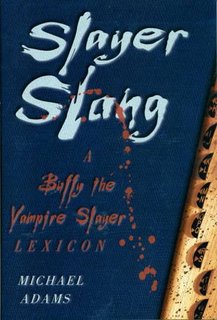 Day 1 opened with Dr. Michael Adams, a philologist and author of (among several others) Slayer Slang, presented 'The Matrix of Motives in Slayer Style.' He discussed the language in the Buffyverse and the use of 'clipped' versus 'full phrasal' idioms, such as 'wig' versus 'wig out'. He proposed that the determining factors for why a character would use one rather than the other were mainly dependent on familiarity and social distinction as opposed to just being jargony hipsters. He also suggested that this use of dialog could also be seen as a form of socio-linguistic competition as shown clearly in the scene where Faith is prodding Buffy about her past with Angel,
Day 1 opened with Dr. Michael Adams, a philologist and author of (among several others) Slayer Slang, presented 'The Matrix of Motives in Slayer Style.' He discussed the language in the Buffyverse and the use of 'clipped' versus 'full phrasal' idioms, such as 'wig' versus 'wig out'. He proposed that the determining factors for why a character would use one rather than the other were mainly dependent on familiarity and social distinction as opposed to just being jargony hipsters. He also suggested that this use of dialog could also be seen as a form of socio-linguistic competition as shown clearly in the scene where Faith is prodding Buffy about her past with Angel,
 Another point that Adams touched on was the fact that theory is basically a shortened or condensed form of the artistic knowledge and information. Theory becomes problematic and redundant when it approaches the extent of the art in that it is no longer shorter than the piece it is explaining. (It's like reading a synopsis that is longer than the actual piece allegedly being summarized) He also argued that 'Good Art' tends to resist theory because to theorize it properly, you would tend to exceed the length of the source.
Another point that Adams touched on was the fact that theory is basically a shortened or condensed form of the artistic knowledge and information. Theory becomes problematic and redundant when it approaches the extent of the art in that it is no longer shorter than the piece it is explaining. (It's like reading a synopsis that is longer than the actual piece allegedly being summarized) He also argued that 'Good Art' tends to resist theory because to theorize it properly, you would tend to exceed the length of the source.Labels: Buffy, Critical Studies, Film, Joss Whedon, Slayage, Television
Bonjour!



Not to begrudge Ken his due. I haven’t seen the film yet, but by all accounts it is a great, sympathetic telling of the beginnings of the Irish Republican Army, with the lone survivor from 28 days Later -Cillian O'Murphy- taking centre stage. However, at the 8th time of entering, it must surely also be recognition for a lifetime of fantastic film-making. Or is that too cynical?
Tagged under:
[Ken Loach]
Labels: News
 My contributions to Boast may take on a Buffy-esque theme for the next while as I will be presenting a paper at SC2: The Slayage Conference on the Whedonverses at Gordon College, Barnesville Georgia this week. The title of my paper is, "Do I Have Mom Hair?": Progressive Parenting in Buffy the Vampire Slayer, and I will be discussing how Buffy Summers represents a successful figure of parenting that borrows from an expansive tradition of maternal and paternal roles to ultimately embody a hybridized version of parenting. It may sound a bit intense, but let me reassure you, it's not. Just a bunch of academics getting together to talk about the cool stuff Joss Whedon creates.
My contributions to Boast may take on a Buffy-esque theme for the next while as I will be presenting a paper at SC2: The Slayage Conference on the Whedonverses at Gordon College, Barnesville Georgia this week. The title of my paper is, "Do I Have Mom Hair?": Progressive Parenting in Buffy the Vampire Slayer, and I will be discussing how Buffy Summers represents a successful figure of parenting that borrows from an expansive tradition of maternal and paternal roles to ultimately embody a hybridized version of parenting. It may sound a bit intense, but let me reassure you, it's not. Just a bunch of academics getting together to talk about the cool stuff Joss Whedon creates. I'll try and post summaries from the lectures I attend.
I'll try and post summaries from the lectures I attend.Labels: Buffy, Critical Studies, Film, Joss Whedon, Slayage, Television
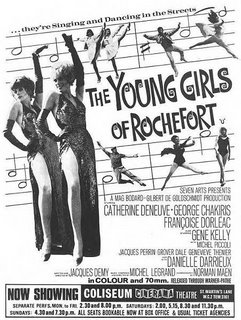 After making the brief comment about my general feelings toward musicals, I'm now looking real sweet as, once again, I cheekily write about another of my favorite musicals, The Young Girls of Rochefort. The cheese-o-meter peeks in this 60s French musical as the charming predictability of the melodrama and intertwining narrative threads don't leave us wanting a more satisfactory payoff. The picture and color is beautiful as is most of the music (scored by Jacques Demy favorite, Michel Legrand).
After making the brief comment about my general feelings toward musicals, I'm now looking real sweet as, once again, I cheekily write about another of my favorite musicals, The Young Girls of Rochefort. The cheese-o-meter peeks in this 60s French musical as the charming predictability of the melodrama and intertwining narrative threads don't leave us wanting a more satisfactory payoff. The picture and color is beautiful as is most of the music (scored by Jacques Demy favorite, Michel Legrand). As politics go, this pacifist film layers its pointed relevance subtly, not unlike fellow Frenchman, Jacques Tati's brilliant Jour de fête. Dancing carnies replace military might in this lovely film about two talented ladies looking for their romantic ideal. Gene Kelly being dubbed into French is fun, but when he starts dancing, it makes everyone else look like someone stole their groove. The guy's got moves. The bit with the 'sadist' axe murderer is a complementing touch of macabre in an otherwise radiant musical.
As politics go, this pacifist film layers its pointed relevance subtly, not unlike fellow Frenchman, Jacques Tati's brilliant Jour de fête. Dancing carnies replace military might in this lovely film about two talented ladies looking for their romantic ideal. Gene Kelly being dubbed into French is fun, but when he starts dancing, it makes everyone else look like someone stole their groove. The guy's got moves. The bit with the 'sadist' axe murderer is a complementing touch of macabre in an otherwise radiant musical.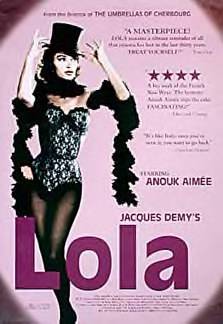 Lola - Leave it up to Jacques Demy to bring melodramatic romanticism into the French New Wave. Lola, played by the dazzling Anouk Aimée, who you might remember from some of Fellini's films (La Dolce Vita, 8 1/2), follows the reflected/parallel lives of a cabaret dancer called 'Lola' (given name, Cecile) and a little girl, Cecile, who both fall in love with American sailors. In true Demy fashion, there is also a tangled set of circumstances that allow the downtrodden protagonist, Roland, to bump into Lola who he has been pining for since childhood. Given that the film is markedly nouvelle vague (minimal cast, natural lighting, hand-held or static photography) the frankness of the scene where Lola and Roland discuss their possible future is beautiful, even though we hate to see the poor guy get shot down.
Lola - Leave it up to Jacques Demy to bring melodramatic romanticism into the French New Wave. Lola, played by the dazzling Anouk Aimée, who you might remember from some of Fellini's films (La Dolce Vita, 8 1/2), follows the reflected/parallel lives of a cabaret dancer called 'Lola' (given name, Cecile) and a little girl, Cecile, who both fall in love with American sailors. In true Demy fashion, there is also a tangled set of circumstances that allow the downtrodden protagonist, Roland, to bump into Lola who he has been pining for since childhood. Given that the film is markedly nouvelle vague (minimal cast, natural lighting, hand-held or static photography) the frankness of the scene where Lola and Roland discuss their possible future is beautiful, even though we hate to see the poor guy get shot down. In Lola, Demy's penchant for making lovely and romantic films isn't lost in the new waviness either, but spins a harmony between the often dour realism of the period and a positive outlook on destiny and fate that approaches idealism. However, destiny is a two-edged blade, and to say that the film ends happily would be to say that only fools and grown-ups experience heartache - as is suggested when the younger Cecile runs off to become a hairdresser rather than a dancer. But what should we expect? We knew what it was when we picked it up.
In Lola, Demy's penchant for making lovely and romantic films isn't lost in the new waviness either, but spins a harmony between the often dour realism of the period and a positive outlook on destiny and fate that approaches idealism. However, destiny is a two-edged blade, and to say that the film ends happily would be to say that only fools and grown-ups experience heartache - as is suggested when the younger Cecile runs off to become a hairdresser rather than a dancer. But what should we expect? We knew what it was when we picked it up.Labels: Critical Studies, Film
How do,
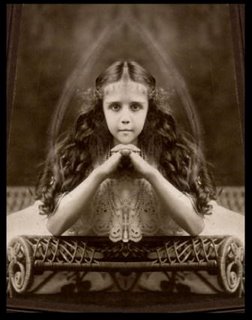
Tagged under:
[Film, Art]
Labels: News
Recently I made a visit down to the local blockbuster in Sunny Rochdale. Known for having good bargains, I surprised myself by getting the following ex-rental DVD's for the equivalent of $15:
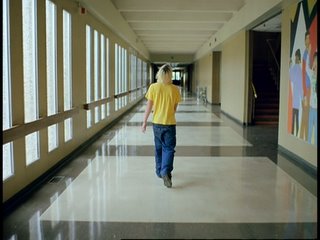

Tagged under:
[dvds]
Labels: DVDs